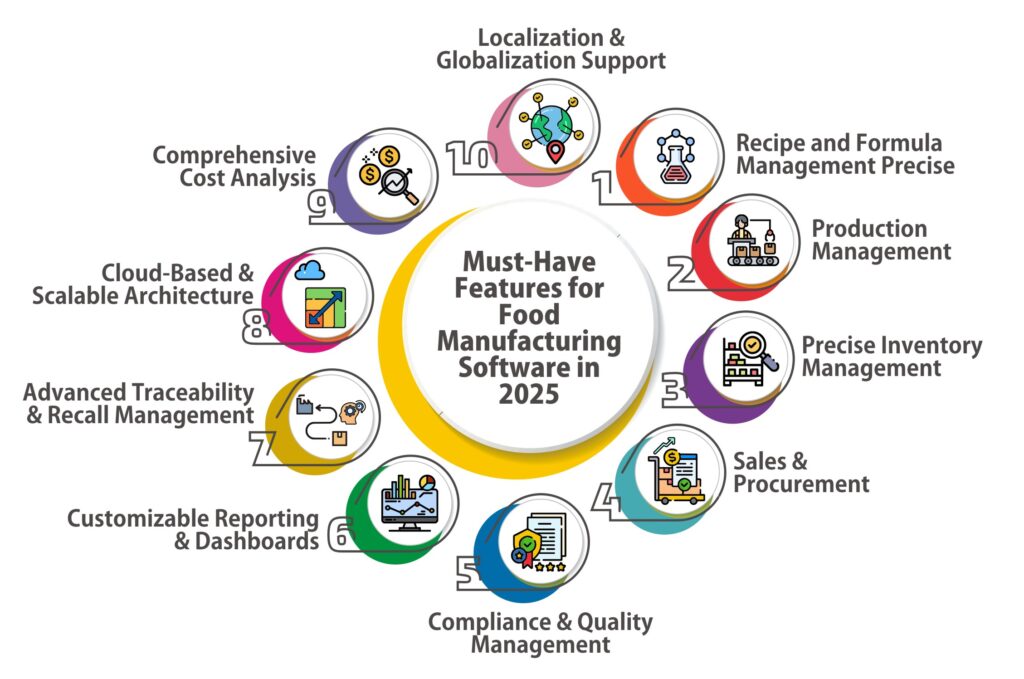Overview of the Blog-
A life without challenges would be a monotonous existence. Struggles act as the catalyst for growth in life.
As the saying goes, “Challenges are gifts that force us to search for a new centre of gravity. Don’t fight them. Just find a new way to stand.”
Overcoming challenges requires you to transform yourself into an upgraded version of your existing one. As, new capabilities and extended power will surely empower you to resolve issues.
Although this is not a philosophical blog, the same secret can be applied to manufacturers working in the manufacturing industry. Businesses operating in the manufacturing landscape will not be completely free from obstacles and challenges anytime soon.
Specific Challenges of the Food Manufacturing Industry
Food manufacturers face a range of challenges, from food safety concerns to supply chain complexities, all of which impact their ability to produce and deliver products efficiently.
The globalization of the food industry has added another layer of complexity, making supply chains more vulnerable to disruptions. Additionally, staying compliant with ever-evolving food regulations—driven by new scientific discoveries and emerging risks—poses a constant challenge for manufacturers.
Ensuring food traceability and recall preparedness is another critical area of concern. Beyond these, the food manufacturing sector grapples with several other hurdles, including:
- Managing food allergens & intolerances
- Ensuring proper labelling & packaging
- Preventing cross-contamination
- Ensuring purity of sourced ingredients
- Managing equipment maintenance & downtime
- Keeping up with changing consumer preferences
These challenges have squeezed the profit margins of food manufacturers this year and may persist or intensify in the coming year. To minimize their impact on manufacturing operations, adopting a robust technological solution like Enterprise Resource Planning (ERP) software is essential.
Given the broad scope and unique demands of the food manufacturing sector—particularly its perishable nature—ERP software must be equipped to address its specific needs effectively. However, identifying and selecting the right ERP solution can be a daunting task for food manufacturers.
This blog is thoughtfully designed to help you navigate this challenge. By highlighting the top 10 essential features of a reliable food ERP software, it provides the insights you need to choose the perfect solution for your business. Stop worrying—start reading and take the first step toward smarter manufacturing.
Must-Have Features for Food Manufacturing Software in 2025
At its core, ERP Software is a technologically advanced digital platform enabling digitization and streamlined management of time-consuming routine manufacturing operations such as Procurement, Inventory Management, Order Management, Supply Chain, and more.
The invention of manufacturing ERP Solutions has proved to be a boon for manufacturing business owners, seeking to establish enhanced productivity and efficiency in their workflows and workforce as well.
Moreover, ERP Software for the food industry is expected to be comprehensive, and equipped with industry-specific functionalities, bringing efficiency, improving performance, resolving quality-related issues, and providing real-time visibility.
Here’s a list of features that are non-comprisable when selecting a Food ERP software:

Recipe and Formula Management:
Recipes serve as the backbone of any food manufacturing business. A good ERP system simplifies and streamlines all the tasks related to recipe management.
- Effortless creation and management of thousands of recipes and formulas.
- Centralized database for recipes along with all recipe versions.
- Facilitating innovation, storage, management, and automatic resizing of formulas/recipes along with maintaining a log of their numerous versions.
- Seamless material substitutions by suggesting alternatives for unavailable materials without compromising on quality.
- Quick ingredient quantity adjustments for different batch sizes.
- Enhancing R&D with tools to experiment, refine, and evaluate recipes while analysing nutritional properties to meet desired dietary and nutritional standards.
- Providing strong integration with the USDA & Genesis database, facilitating easy access to accurate nutritional data and regulatory standards to ensure compliance.
Production Management:
The production module of food ERP software helps ensure streamlined and efficient production planning and scheduling by:
- Using Master Production Planning (MPS) to align production schedules with demand and supply, ensuring timely output.
- Calculating the quantity of material required based on production schedules, reducing waste, and avoiding stock outs.
- Providing real-time insights of production related to batch progress, resource utilization, and machine performance.
- Facilitating Batch Processing to handle production in manageable and consistent quantities, ensuring standardization.
- Optimizing batch size as per the demand, preventing wastage.
- Supporting hard lot allocation, enabling enhanced traceability and easy identification during quality issues.
- Incorporating inspection plans to ensure quality checks at every production stage.
- Generating critical material reports to identify and prioritize essential materials, avoiding disruptions in production.
Precise Inventory Management:
- Streamlining management by categorizing inventory based on attributes, size, and colour, and adopting advanced tracking options like RFID, barcodes, serial numbers, etc.
- Tracking shelf-life and expiry dates to reduce waste and ensure timely utilization.
- Performing intricate tasks with ease including catch weight management, physical counting, and automatic unit conversions precisely.
- Providing real-time updates on stock levels, warehouse inventory transfers, etc.
Sales & Procurement:
Food manufacturers must excel in distribution functions too. A sophisticated ERP system helps you streamline operations by:
- Automating purchase requisitions, approvals, and order placements, eliminating the need for manual intervention and the risk of errors.
- Centralising repository of supplier information with performance-tracking insights, ensuring reliable and cost-efficient sourcing.
- Real-time updates into inventory levels help ensure optimal inventory stock always.
- Automating the entire sales process right from, capturing orders to fulfilment, ensuring accuracy and efficiency.
- Maintaining 360-degree information on prospects, targets, and customers along with organizing tasks, and calls, while assessing the progress of the opportunity at each step.
- Simplifying the application of discounts, and promotional orders while automating tax calculations and reporting for accurate invoicing.
Compliance Management & Quality Management:
Quality is one of the critical areas where manufacturers struggle as food products have a limited shelf-life, increasing the chances of contamination. A good ERP software is meticulously designed to address the regulatory and quality requirements of food manufacturers in many ways.
- Establishing quality checks for raw materials, in-process products, finished goods, etc.
- Providing instant alerts for deviations from set quality standards, ensuring consistency throughout the production.
- Creating efficient sampling plans, minimizing the cost of inspection.
- Recording test result values, providing quality status as approved and rejected, and ensuring only approved materials proceed through the production.
- Built-in templates and workflows aligned with global safety standards such as FSMA, HACCP, ISO 22000, etc.
- Automated generation of reports, including batch records, traceability logs, and non-conformance reports, keeping the organization audit-ready always.
- Automating the process of generating labels in country-specific formats
- Effectively identifying and tracking the allergenic ingredients, preventing contamination across production lines.
Customizable Reporting & Dashboards:
Effective decision-making is the ability that food manufacturers often lack, leading to serious consequences and affecting business on multiple fronts including finance, operational efficiency, compliance, etc. A capable ERP Software strengthens the decision-making power of manufacturers by:
- Monitoring critical metrics including production yields, waste levels, and downtime.
- Providing real-time KPIs and analytics, and generating interactive reports, ensuring data-driven decision-making always.
Advanced Traceability & Recall Management:
- Providing end-to-end traceability of materials from suppliers to consumers, identifying any deviation promptly.
- Automating recall processes with comprehensive lot tracking.
Cloud-Based, Scalable, and Integrating Architecture:
- Easy scalability to meet growing production demands.
- Cloud-based accessibility for seamless data integration and storage.
- Providing seamless integration with E-commerce platforms including Shopify, Amazon, Flipkart, Walmart, Magento, etc. to handle and manage omni-channel sales.
Comprehensive Cost Analysis:
- Calculating production costs including raw materials, WIP, labour, overhead, and transportation costs.
- Comparing the costs of multiple formulas to determine the most cost-effective option for production.
- Determining costs for different packaging sizes to optimize expenses.
- Performing what-if analysis, and evaluating the financial impact of different production scenarios.
Localization & Globalization Support:
- Simplifying business by handling transactions in various currencies, and ensuring communication in multiple languages.
- Offering seamless connection with the Point of Sales system, synchronizing sales data with other business operations.
Final Words:
In 2025, food manufacturers might face evolving challenges that demand agile, efficient, and future-ready solutions. Apart from a choice, selecting an ERP Software with the right features has become a strategic necessity for staying competitive, productive, and profitable.
If you are a food manufacturer and looking for a competent and comprehensive Food ERP Solution that could assist you on every possible front of your business then, BatchMaster ERP for Food Manufacturing should be your preferred choice.
Besides the above-mentioned functionalities, the BatchMaster ERP for food comes with numerous other capabilities that simplify your manufacturing processes. To know more about it, feel free to contact us.



















